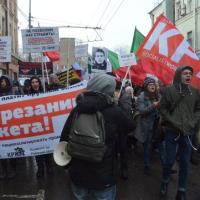
Unrest grows over economic and social issues
“In the future, it is likely that the years 2008-2012 will be seen as the period in which the relative optimism of the early Putin years with their relative stability and economic growth was replaced by a period of stagnation, during which the regime lost support before finally collapsing”. So started the main resolution on the current situation and the tasks facing the conference of the Russian CWI organization, which was held on 18-19 May.
A lively discussion followed during which the lessons of the previous year’s protests were analysed and a strategy mapped out for involvement in future events. While many liberals and pro-market oppositionists believe that Russia is simply collapsing into authoritarianism, those who participated in the discussion pointed out that this is not necessarily the likely outcome. With the Russian economy stagnant and possibly already in a second recession, the government has little movement for maneuver. On top of this, the ruling class appears to be fragmenting – corruption scandals have reached the very top of society with even the defense minister facing serious charges.
The social base of the Putting regime is nowhere near as robust as it was before the protests of last year and the budget cuts proposed by the government, particularly in the health and education sectors, will lead to a further undermining.
Already analysts are commenting that while last year’s protests, mainly in Moscow against the fraudulent elections and undemocratic laws are running out of steam, a new stage of the protest is opening up in the regions based on economic and social issues.
The conference noted that even some of the minor concessions granted on electoral rules, as a result of last year’s protests, such as allowing independent candidates to participate in elections at local and regional level, offer opportunities to the left and workers’ movement to take advantage of electoral work and should be used. But most importantly, the conference pointed out that the final outcome of the drift towards authoritarianism has not yet been decided and can be checked if the working class moves into action.
There was also a discussion of how as socialists we should present our programme to those involved in struggle. While during the democracy protests it was possible to use slogans directed at how the political system works, in the coming phase of social and economic protests, we will need to put the everyday demands of those participating more to the fore and linking them to a clear strategy to fight back. An example was given by comrades involved in the new independent trade union for medical workers. While the main demands of the workers involved concerned wages and the shortage of resources, our demand to take the insurance companies into state control, unify the funds into one fund under the control of the medical staff and patient, found a warm reception. Doctors involved in the independent trade union bitterly complained that these insurance companies are consistently demanding that less and less time is given to treating patients.
This discussion led to the decision that in the coming period special attention would be paid to the development of a campaign against budget cuts and around trade unions.
Lessons of ‘Occupy Abai’
The discussion on organizational tasks began with a review of the work over the last year and particularly our intervention in the protests and ‘Occupy Abai’. It was pointed out that at the very start of the protests, we warned that although the spark for the protest movement was the falsification of the parliamentary elections in December 2011, the discontent was fuelled by the increasingly difficult social and economic conditions and that the Left needed to put these questions to the fore. Our perspective was demonstrated to be correct, as protesters began raising such demands, even forming an “education column” in defense of free education. Our participation in the elections for the leadership of the ‘Coordination council of the opposition’ saw us gain tens of thousands of votes for our three candidates.
This led onto the consideration of the “party gold”. The left in Russia, particularly around the ‘Left Front’ and to some degree the ‘Russian Socialist Movement’, has been rocked by a scandal over financing. There are nearly 30 people being held on charges following police attacks on the demonstration on 6th May, last year. Increasingly those arrested are from the Left. Unfortunately their position has been undermined by the admission by one of them, Konstantin Lebedev, a member of both the above organizations, that he acted as a go-between between Sergei Udaltsov’s ‘Left front’ and the Georgian government who were providing finance. This situation has arisen because many lefts are cynical about the ability of ordinary people to struggle – instead they view their own actions as a series of “business projects” that require financing, and it seems, it is not important by whom.
But as the speaker introducing the organization report commented, for the CWI in Russia the “party gold” is not measured in rubles but by the increase in young members. Since the start of the protests, our organization has grown by 30%, with the new members playing a key role. By confidently intervening in events, with the sale of literature and collection of money from sympathisers, there was a significant improvement in the resources available to the organization over the last year. The conference adopted new targets for growth and agreed to launch a ‘Development Fund’. Elections were held for the leadership of the organization. The conference concluded with a report of the work of the CWI and an appeal to support the South African CWI comrades who are playing a vital role in helping to build the new Workers and Socialist Party.

Be the first to comment